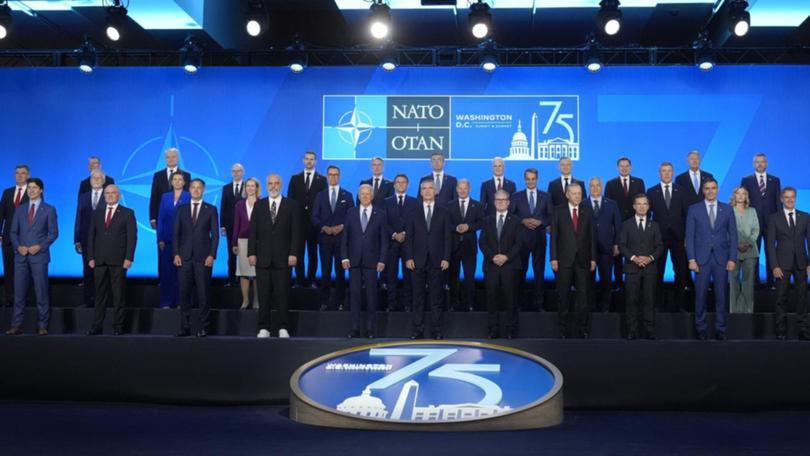NATO allies move to counter Russia and bolster Ukraine by the United States deploying longer-range missiles
Joe Biden says NATO is "stronger than it's ever been" and that Ukraine can and will stop Russian President Vladimir Putin "with our full, collective support".

The United States will start deploying longer-range missiles in Germany in 2026, the two countries have announced at a meeting of the NATO alliance, a major step aimed at countering what the allies say is a growing threat from Russia toward Europe.
The decision will send Germany the most potent US weapons to be based on the European continent since the Cold War, in a clear warning to Russian President Vladimir Putin.
A US-German statement said the “episodic deployments” were in preparation for longer-term stationing in Europe of capabilities that would include SM-6, Tomahawk and developmental hypersonic weapons with greater range.
Sign up to The Nightly's newsletters.
Get the first look at the digital newspaper, curated daily stories and breaking headlines delivered to your inbox.
By continuing you agree to our Terms and Privacy Policy.The move would have been banned under the Intermediate-Range Nuclear Forces Treaty signed by the US and the Soviet Union in 1987 but that collapsed in 2019.
“We cannot discount the possibility of an attack against Allies’ sovereignty and territorial integrity,” the allies said in a communique released on Wednesday.
More aid was headed to Ukraine as the allies bolstered President Volodymyr Zelenskiy.
A communique said the allies intend to provide Ukraine with at least 40 billion euros ($A64 billion) in military aid within the next year, but stopped short of the multi-year commitment NATO Secretary General Jens Stoltenberg had sought.
The document also strengthened past NATO language on China, calling it a “decisive enabler” of Russia’s war effort in Ukraine and saying Beijing continues to pose systemic challenges to Euro-Atlantic security.
Biden said in a speech on Tuesday that NATO was “stronger than it’s ever been” and that Ukraine can and will stop Russian President Vladimir Putin “with our full, collective support”.
On Wednesday, he said he was pleased all NATO members were pledging to expand their industrial bases and to develop plans for defence production at home.
“We cannot allow the alliance to fall behind,” Biden said.
“We can and will defend every inch of NATO territory and we’ll do it together.”
Biden, 81, has faced questions about his fitness for office after fumbling a June 27 debate and hopes the NATO spotlight will help him stage a comeback of sorts, surrounded by allied leaders he has spent his three years in office cultivating.
However, November’s US presidential election could presage a sharp change in Washington’s support for Ukraine and NATO. Republican candidate Donald Trump, 78, has questioned the amount of aid given to Ukraine to fight Russia’s invasion and US support for allies generally.
On Wednesday, Trump told Fox News Radio he would not pull the US out of NATO but reiterated that he wanted members to pay more. “I just want them to pay their bills. We’re protecting Europe. They take advantage of us very badly,” he said.
Trump had pressed congressional Republicans to stall military aid for Ukraine before later reversing course.
While Biden has been seeking to rally allies and domestic support, several high-ranking European officials met a top foreign policy adviser to Trump during the summit.
Stoltenberg told reporters he expected allies to agree upon a “substantial” package for Kyiv that would involve a new NATO command for Ukraine to provide security assistance and training.
There would be new announcements of immediate military support, he said, including air defence and moves to ensure full interoperability between Ukrainian forces and NATO forces.
NATO members have announced the delivery of five additional Patriot and other strategic air defence systems to help Ukraine.
The communique says the alliance will continue to support Ukraine “on its irreversible path to full Euro-atlantic integration, including NATO membership”. That language had been a major point of contention among the allies.
It called on China to cease material and political support for Russia’s war effort. It expressed concern about China’s space capabilities, referenced the rapid expansion of its nuclear arsenal, and urged Beijing to engage in strategic risk reduction talks.
